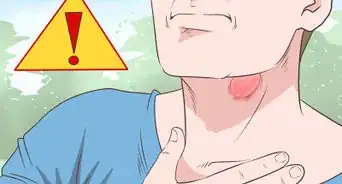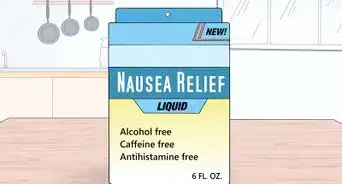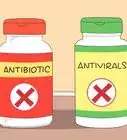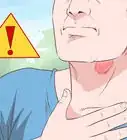This article was co-authored by Chris M. Matsko, MD. Dr. Chris M. Matsko is a retired physician based in Pittsburgh, Pennsylvania. With over 25 years of medical research experience, Dr. Matsko was awarded the Pittsburgh Cornell University Leadership Award for Excellence. He holds a BS in Nutritional Science from Cornell University and an MD from the Temple University School of Medicine in 2007. Dr. Matsko earned a Research Writing Certification from the American Medical Writers Association (AMWA) in 2016 and a Medical Writing & Editing Certification from the University of Chicago in 2017.
There are 8 references cited in this article, which can be found at the bottom of the page.
wikiHow marks an article as reader-approved once it receives enough positive feedback. In this case, 91% of readers who voted found the article helpful, earning it our reader-approved status.
This article has been viewed 117,143 times.
Epstein-Barr virus (EBV) is actually a member of the herpes virus family and one of the most common infectious agents among Americans — at least 90% of the population has been infected during their lives.[1] Most people, especially young children, display no (or very mild) symptoms when infected, although some adults and immunocompromised individuals can develop illnesses, such as mononucleosis and lymphoma. EBV spreads through bodily fluids, primarily saliva, which is why its nicknamed the "kissing disease." There is no vaccine to protect against EBV infection, nor are antiviral medications typically used to treat acute (short-term) cases, so prevention and alternative therapies are your main strategies.
Steps
Reducing Risk of EBV Infection
-
1Maintain a healthy immune system. A strong immune response is essential for any type of infection. Your immune system consists of specialized white blood cells that search for and attempt to destroy potential pathogens, like EBV. However, when the system is weakened, harmful microorganisms grow and spread virtually unchecked. Keeping your immune system strong and functioning properly is a logical and natural approach to preventing EBV and virtually all other infectious diseases.
- Getting more sleep (or better quality sleep), eating more fresh fruit and veggies, practicing good hygiene, drinking lots of purified water, and regular cardiovascular exercise are all proven ways to keep your immune system functioning the way it was designed to.[2]
- Your immune system will also benefit from cutting down on refined sugars (soda pop, candy, ice cream, most baked goods), reducing your alcohol consumption, and refraining from smoking tobacco products.
- In addition to poor lifestyle choices, people's immune systems can be compromised by severe stress, debilitating diseases (cancer, diabetes, other infections), and certain medical procedures or prescriptions (surgery, chemotherapy, radiation, steroids, over-medicating).
-
2Get plenty of vitamin C. Although there is not much reliable research investigating the effects of vitamin C on viruses[3] it is thought by some to have antiviral and immune boosting properties. This could be helpful for preventing and minimizing the effects of EBV infections.[4]
- Recommended daily intake of vitamin C ranges from 75 mg to 125 mg (depending on gender and whether or not you smoke). [5] There is not good evidence that taking any more than this amount will improve your immune system.[6]
- To combat infections, consider taking at least 1,000 mg daily in two divided doses.
- Excellent natural sources of vitamin C include citrus fruits, kiwis, strawberries, tomatoes, and broccoli.
Advertisement -
3Consider supplements related to the immune system. There are many other vitamins, minerals, and herbal preparations that may have antiviral and other useful properties. Unfortunately, none of them have been rigorously studied in relation to preventing or combating EBV.[7] As such, EBV is difficult to eradicate simply by boosting immunity, but it may be worth a try.
- Other immune supplements include vitamins A and D, zinc, selenium, echinacea, and astragalus root.[8]
- Vitamin D3 is produced in your skin in response to intense summer sunshine and a necessary part of a healthy immune system — consider supplementing with D3 during winter months or year-round if you are not exposed to at least 15 minutes of direct sunshine every day.
-
4Be careful who you kiss. The vast majority of people have been infected with EBV at some point. Some people fight it off effectively with no symptoms, some have mild symptoms, and some are ill for weeks or months. As such, not kissing or having sexual contact with anyone is a great way to prevent EBV and other viral infections. Avoid kissing people who appear to be ill, especially if they have a sore throat or they’re especially tired.[9]
- Keep in mind that EBV can spread without the presence of any obvious symptoms.
- Although nicknamed the "kissing disease," EBV infection can also spread via saliva from sharing beverages and utensils, as well as via other body fluids during sexual relations.
- While most Americans have been infected with EBV, mononucleosis appears more common in Caucasian than in African-American populations.
- Other risk factors for EBV infection include being female, living in tropical climates, and being sexually active.
Considering Your Treatment Options
-
1Treat symptoms if they are significant. There is no standard medical treatment for EBV because it often doesn't cause symptoms, and the symptoms that do show up go away within a few months.[10] However, if your symptoms are causing significant discomfort, take acetaminophen, ibuprofen, or naproxen to ease your pain. For severe throat swelling, see your doctor. Bed rest isn't usually recommended, although some people with mononucleosis often feel exhausted.
- EBV leads to mononucleosis in about 1/3 to 1/2 of teenagers and adults infected with the virus — common symptoms include fever, sore throat, swollen lymph glands and severe fatigue.
- Keep in mind that many over-the-counter medications for adults should not be given to children (aspirin in particular).
- In up to 1/2 of mononucleosis cases the spleen becomes swollen due to filtering all the abnormal blood cells out of the blood. Avoid excessive activity and any trauma to the abdomen if your spleen is inflamed (the area below your heart).
- Rare complications related to EBV include brain inflammation (encephalitis or meningitis), lymphoma, and some other cancers.
-
2Consult with your doctor if your infection is chronic. If your EBV infection or mononucleosis persists for many months, then ask your doctor about the effectiveness of antivirals or other potent medications. Chronic EBV infection is not common, but when it persists for many months, it has a significantly negative impact on the immune system and quality of life. Your doctor may be able to prescribe antiviral medications or steroids to treat your symptoms.[11]
- Anecdotal reports suggest that antiviral therapy might be effective in some cases of chronic EBV infection.[12]
- Drugs that suppress immunity can also inhibit the immune response to EBV and may allow virus-infected cells to proliferate further, so ask your doctor if the risk is worth it.
- Common side effects from taking antivirals include skin rash, stomach upset, diarrhea, fatigue, joint pain, headache, and dizziness.
- There have been substantial efforts to develop vaccines against EBV, but none are currently effective.
Warning
- Mono is sometimes confused with strep throat by doctors, who then prescribe antibiotics, such as amoxicillin. When this occurs by mistake, a skin rash frequently develops in response to the antibiotics.
References
- ↑ http://scienceblog.cancerresearchuk.org/2014/04/09/epstein-barr-virus-and-the-immune-system-are-cures-in-sight/
- ↑ http://www.health.harvard.edu/staying-healthy/how-to-boost-your-immune-system
- ↑ https://www.frontiersin.org/articles/10.3389/fimmu.2020.574029/full
- ↑ http://lpi.oregonstate.edu/mic/micronutrients-health/immunity
- ↑ https://ods.od.nih.gov/factsheets/VitaminC-HealthProfessional/
- ↑ https://www.frontiersin.org/articles/10.3389/fimmu.2020.574029/full
- ↑ http://scienceblog.cancerresearchuk.org/2014/04/09/epstein-barr-virus-and-the-immune-system-are-cures-in-sight/
- ↑ http://www.health.harvard.edu/staying-healthy/how-to-boost-your-immune-system
- ↑ http://www.cdc.gov/epstein-barr/about-ebv.html
About This Article
EBV is often symptomless and should go away within a few months, so treatment isn't usually necessary. However, if you have a fever or a swollen throat, you can take anti-inflammatories, like ibuprofen and naproxen, to reduce your discomfort. If your spleen feels inflamed, try to avoid physical activity and get plenty of rest. If your EBV doesn’t go away after a few months, you should contact your doctor. For more tips from our Medical co-author, including how to prevent EBV infection, read on!
-Step-1-Version-2.webp)
-Step-2-Version-2.webp)
-Step-3.webp)
-Step-4.webp)
-Step-5.webp)
-Step-7.webp)




-Step-11-Version-2.webp)






-Step-13.webp)
















































Medical Disclaimer
The content of this article is not intended to be a substitute for professional medical advice, examination, diagnosis, or treatment. You should always contact your doctor or other qualified healthcare professional before starting, changing, or stopping any kind of health treatment.
Read More...